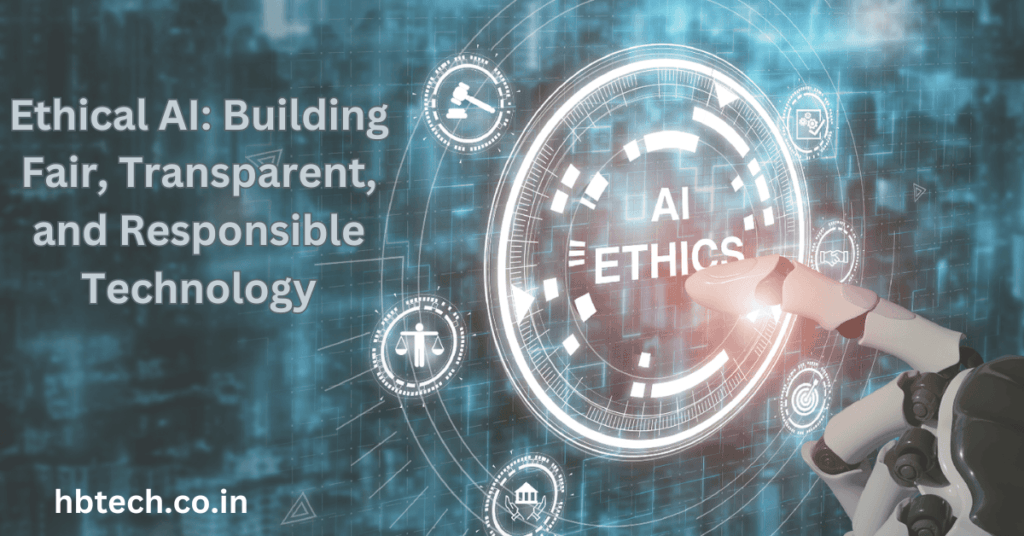AI, or artificial intelligence, is transforming the way we live and work, impacting industries from healthcare to education to social media. But with all the good AI can do, it also brings new questions about responsibility, fairness, and safety. “Ethical AI” is about making sure AI is developed and used in ways that respect human rights, protect personal privacy, and uphold fairness. Here we’ll dive into what ethical AI means, why it matters, the challenges involved and what steps we can take to create AI that benefits everyone.
Ethical AI Matter
As AI becomes more present in our lives, its influence grows. AI algorithms recommend movies, determine job applications, and even help doctors diagnose illnesses. With all this power, it ’s essential that AI operates in ways that are fair, accountable , and transparent. Without ethical guidelines, AI can accidentally (or even intentionally) cause harm. Here are some key reasons why ethical AI is so important:
- Protecting Privacy: AI often relies on massive amounts of data, much of it personal. Ethical AI prioritizes transparency and ensures that people’s data is handled with care, protecting their right to privacy.
- Preventing Bias: AI learns from historical data, which means it can pick up on human biases in that data. For instance, if an AI system learns from hiring decisions that have historically favored one demographic, it might continue that bias. Ethical AI aims to reduce bias and promote fairer results.
- Ensuring Accountability: When AI makes important decisions, such as in healthcare or policing, it’s critical that we understand how those decisions are made. Ethical AI promotes accountability by making it clear who’s responsible for the AI’s decisions and how to address any mistakes.
Key Principles of Ethical AI
Here are the core principles that guide ethical AI;
- Fairness: AI should work without unfairly favoring one group over another. This requires using diverse training data, testing for bias. and ensuring the AI model is inclusive.
- Accountability: If an AI system makes an error or causes harm, someone must be responsible. Clear guidelines help identify who is accountable and how to fix problems when they arise.
- Transparency: AI should operate in ways that allow people to understand its decision-making. This transparency builds trust and helps users understand how the system works.
- Privacy and Security: Ethical AI must handle personal data with strict privacy and security measures. AI should minimize the use of personal data, comply with regulations, and ensure data is protected from unauthorized access.
- Sustainability: Training AI can be resource-intensive, using up significant energy. Ethical AI considers its environmental footprint, promoting methods that minimize resource use.
- Human-Centric Design: AI should assist people, not replace or control them. Ethical AI emphasizes helping humans make decisions instead of trying to replace human judgment altogether.
Challenges in Ethical AI
While these principles sound straightforward, implementing them in real-world AI systems can be challenging. Here are some common issues
- Bias in Data: Bias in AI often starts with bias in data. Ethical AI development must carefully select and prepare data to ensure it’s fair. However, bias in historical data, which may reflect societal biases, is hard to eliminate completely.
- Complexity: Some AI models, particularly those used in deep learning, operate as “black boxes” that make decisions in ways even experts can’t easily explain. This lack of transparency can lead to mistrust and misunderstandings about how the system works.
- Lack of Universal Standards: While ethical AI is a global concern, there isn’t a single, agreed-upon set of standards. Different countries have different rules and approaches, which can make it difficult for companies to know which standards to follow .
- Balancing Regulation and Innovation: Too many restrictions can slow innovation , while too few can lead to risky or harmful applications. Finding the right balance is critical to creating a responsible AI ecosystem.
Steps to Promote Ethical AI
- Create Ethical Guidelines: Many tech companies are developing ethical guidelines for AI, outlining principles to guide their AI projects. These guidelines promote a culture of responsibility, setting a standard for fairness, transparency, and respect for users.
- Conduct Regular Audits: Regular audits of AI systems can catch problems before they become serious issues. Organizations can run tests to ensure their AI systems are fair, safe , and free from major biases.
- Invest in Explainable AI Research: Making AI models understandable is a key step in creating ethical AI. Research into explainable AI helps make these systems more transparent, especially in critical fields like healthcare and finance.
- Set Up AI Ethics Committees: Ethics committees are becoming more common in companies and research institutions, tasked with overseeing AI projects. They offer guidance on complex ethical questions, helping developers make better choices .
- Encourage Global Collaboration: Ethical AI requires cooperation across borders. Policymakers, industry leaders, and researchers can work together to create universal standards that promote ethical practices worldwide.
Ethical AI isn’t just about avoiding harm—it ’s about building trust, creating transparency, and ensuring that technology benefits everyone. As AI becomes an even larger part of our lives, building AI systems with fairness, accountability, and respect for privacy is essential.
By sticking to core principles and working together, we can help ensure that AI evolves into a technology that serves the greater good, respecting individual rights and promoting fairness and transparency in everything it touches. Ethical AI isn’t just a goal; it’s the path forward if we want to build a responsible future with AI.
Frequently Asked Questions(FAQs)
What is Ethical AI?
Ethical AI refers to the development and use of artificial intelligence in a way that respects human rights, promotes fairness, protects privacy and ensures accountability. Ethical AI aims to minimize biases, be transparent in its decisions, and serve society responsibly.
Why is Ethical AI important?
Ethical AI is essential because AI is increasingly influencing crucial aspects of our lives, from healthcare and finance to education and employment. By focusing on ethics, we can help ensure that AI decisions are fair, privacy is respected, and AI is used responsibly, benefiting everyone without causing unintended harm.
What are the core principles of Ethical AI?
The main principles of ethical AI include:
Fairness: Ensuring that AI does not unfairly favor certain groups.
Accountability: Clarifying who is responsible for AI decisions and outcomes.
Transparency: Making AI’s decision-making processes understandable to users.
Privacy and Security: Protecting users’ data and ensuring it is securely handled.
Sustainability: Reducing the environmental impact of AI development.
Human-Centric Design: Designing AI to assist and empower humans rather than replace them.What are the challenges in implementing Ethical AI?
Challenges in ethical AI include
Bias in data: AI models may learn biases from historical data.
Black-box complexity: Some AI models are complex and difficult to interpret.
Lack of universal standards: Different countries have varied AI regulations.
Balancing regulation and innovation: Ensuring responsible development without stifling progress.How can organizations promote Ethical AI?
Organizations can promote ethical AI by creating internal ethical guidelines, conducting regular audits, investing in explainable AI research, forming AI ethics committees, and collaborating with other organizations to develop universal ethical standards.
How does Ethical AI protect privacy?
Ethical AI respects privacy by handling personal data with care, minimizing data usage, securing data from unauthorized access, and complying with data protection regulations like GDPR. This protects individuals’ rights and ensures that data is used responsibly.









